9 start with G start with G
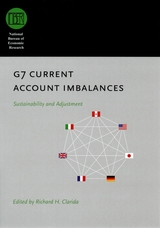
The current account deficit of the United States is more than six percent of its gross domestic product—an all-time high. And the rest of the world, including other G7 countries such as Japan and Germany, must collectively run current account surpluses to finance this deficit. How long can such unevenness between imports and exports be sustained, and what form might their eventual reconciliation take? Putting forth scenarios ranging from a gradual correction to a crash landing for the dollar, G7 Current Account Imbalances brings together economists from around the globe to consider the origins, status, and future of those disparities.
An esteemed group of collaborators here examines the role of the bursting of the dot-com bubble, the history of previous episodes of current account adjustments, and the possibility of the Euro surpassing the dollar as the leading international reserve currency. Though there are areas of broad agreement—that the imbalances will ultimately decline and that currency revaluations will be part of the solution—many areas of contention remain regarding both the dangers of imbalances and the possible forms of adjustment.
This volume will be of tremendous value to economists, politicians, and business leaders alike as they look to the future of the G7 economies.

The Gender Impact of Social Security Reform compares the gendered outcomes of social security systems in Chile, Argentina, and Mexico, and presents empirical findings from Eastern and Central European transition economies as well as several OECD countries. Women’s positions have improved relative to men in countries where joint pensions have been required, widows who have worked can keep the joint pension in addition to their own benefit, the public benefit has been targeted toward low earners, and women’s retirement age has been raised to equality with that of men. The Gender Impact of Social Security Reform will force economists and policy makers to reexamine the design features that enable social security systems to achieve desirable gender outcomes.

Moving away from state-centered and Marxist approaches to the study of the European monetary integration process, Karl Kaltenthaler offers a new analytical framework to assess the dynamics within and among the participating countries. Using official and unofficial documents as well as interviews with players ranging from presidents of the Bundesbank to functionaries in the trade unions, Kaltenthaler argues that the number of decision makers negotiating policy and their accountability to interest groups, political parties, government ministries, and Germany’s central bank have made Germany’s fluctuations in policy inevitable. Germany and the Politics of Europe’s Money examines twenty years of German policy through an analysis of four key episodes: the creation of the European Monetary System, the creation of the Franco-German Economic and Financial Council, the establishment of policy toward the European Monetary Union, and the institutional transformation of the EMS in the 1990s. It thus brings a new understanding to Germany’s dynamic policies and the political forces behind them.

Nowhere is the conflict over rule setting more evident than in the simmering “standards wars” over the rules that define quality and enable the adjudication of disputes. In Global Rivalries, Amy A. Quark explores the questions of how rules are made, who makes them, and how they are enforced, using the lens of cotton—a simple commodity that has become a poignant symbol of both the crisis of Western rule making power and the potential for powerful new rivals to supplant it. Quark traces the strategies for influencing rule making processes employed not only by national governments but also by transnational corporations, fiber scientists, and trade associations from around the globe. Quark analyzes the efficacy of their approaches and the implications for more marginal actors in the cotton trade, including producers in West Africa.
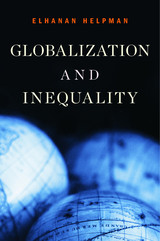
One of the world’s leading experts on international trade explains that we must look beyond globalization to explain rising inequality.
Globalization is not the primary cause of rising inequality. This may come as a surprise. Inequality within nations has risen steadily in recent decades, at a time when countries around the world have eased restrictions on the movement of goods, capital, and labor. Many assume a causal relationship, which has motivated opposition to policies that promote freer trade. Elhanan Helpman shows, however, in this timely study that this assumption about the effects of globalization is more myth than fact.
Globalization and Inequality guides us through two decades of research about the connections among international trade, offshoring, and changes in income, and shows that the overwhelming conclusion of contemporary research is that globalization is responsible for only a small rise in inequality. The chief causes remain difficult to pin down, though technological developments favoring highly skilled workers and changes in corporate and public policies are leading suspects. As Helpman makes clear, this does not mean that globalization creates no problems. Critics may be right to raise concerns about such matters as cultural autonomy, child labor, and domestic sovereignty. But if we wish to curb inequality while protecting what is best about an interconnected world, we must start with a clear view of what globalization does and does not do and look elsewhere to understand our troubling and growing divide.
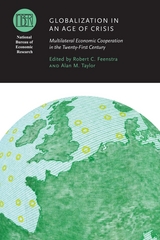
Prompted by these questions, Robert C. Feenstra and Alan M. Taylor have brought together top researchers with policy makers and practitioners whose contributions consider the ways in which the global economic order might address the challenges of globalization that have arisen over the last two decades and that have been intensified by the recent crisis. Chapters in this volume consider the critical linkages between issues, including exchange rates, global imbalances, and financial regulation, and plumb the political and economic outcomes of past policies for what they might tell us about the future of the global economic cooperation.
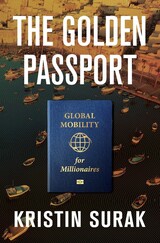
"[A] fascinating study of how people―and their capital―seek to move around a world that is at once hugely interconnected and driven by inequities…definitive, detailed, and unusually nuanced.”
―Atossa Araxia Abrahamian, Foreign Affairs
The first comprehensive on-the-ground investigation of the global market for citizenship, examining the wealthy elites who buy passports, the states and brokers who sell them, and the normalization of a once shadowy practice.
Our lives are in countless ways defined by our citizenship. The country we belong to affects our rights, our travel possibilities, and ultimately our chances in life. Obtaining a new citizenship is rarely easy. But for those with the means—billionaires like Peter Thiel and Jho Low, but also countless unknown multimillionaires—it’s just a question of price.
More than a dozen countries, many of them small islands in the Mediterranean, Caribbean, and South Pacific, sell citizenship to 50,000 people annually. Through six years of fieldwork on four continents, Kristin Surak discovered how the initially dubious sale of passports has transformed into a full-blown citizenship industry that thrives on global inequalities. Some “investor citizens” hope to parlay their new passport into visa-free travel—or use it as a stepping stone to residence in countries like the United States. Other buyers take out a new citizenship as an insurance policy or to escape state control at home. Almost none, though, intend to move to their selected country and live among their new compatriots, whose relationship with these global elites is complex.
A groundbreaking study of a contentious practice that has become popular among the nouveaux riches, The Golden Passport takes readers from the details of the application process to the geopolitical hydraulics of the citizenship industry. It’s a business that thrives on uncertainty and imbalances of power between big, globalized economies and tiny states desperate for investment. In between are the fascinating stories of buyers, brokers, and sellers, all ready to profit from the citizenship trade.

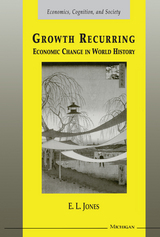
Eric Jones has written a substantial new introduction for this edition, which includes discussions of early evidence of growth episodes and the relation of these points to the Industrial Revolution, and the relevance of the East Asian "miracle" to his thesis.
READERS
Browse our collection.
PUBLISHERS
See BiblioVault's publisher services.
STUDENT SERVICES
Files for college accessibility offices.
UChicago Accessibility Resources
home | accessibility | search | about | contact us
BiblioVault ® 2001 - 2024
The University of Chicago Press









